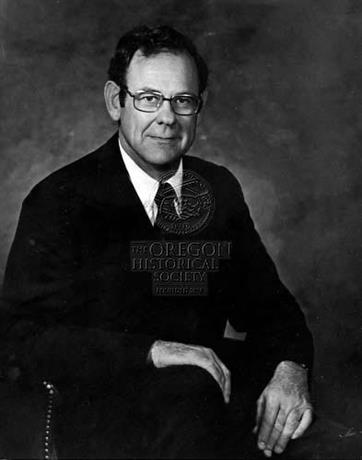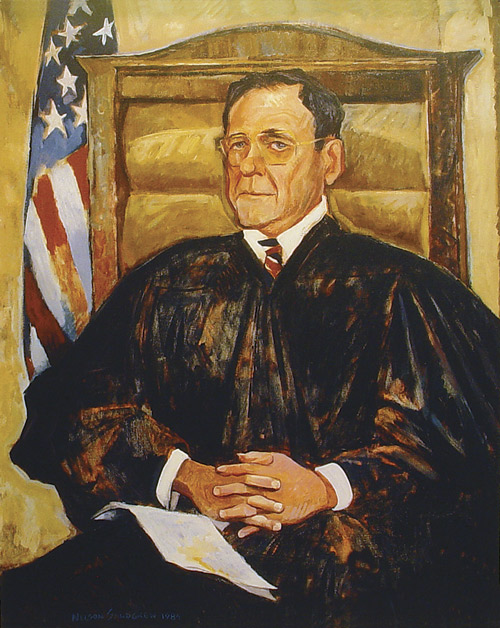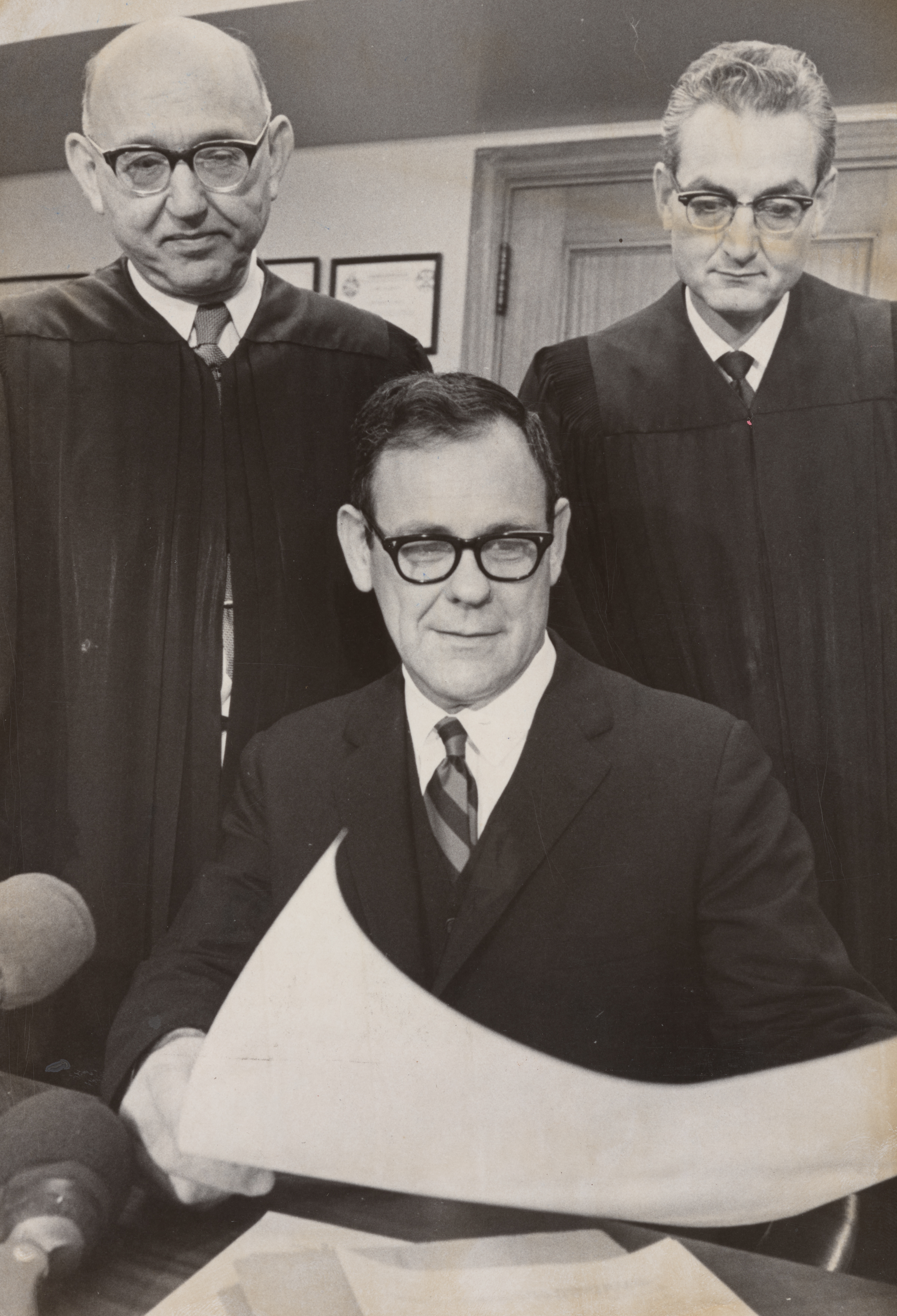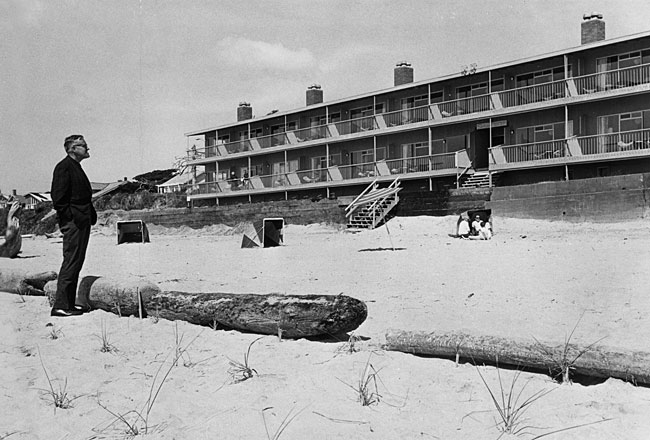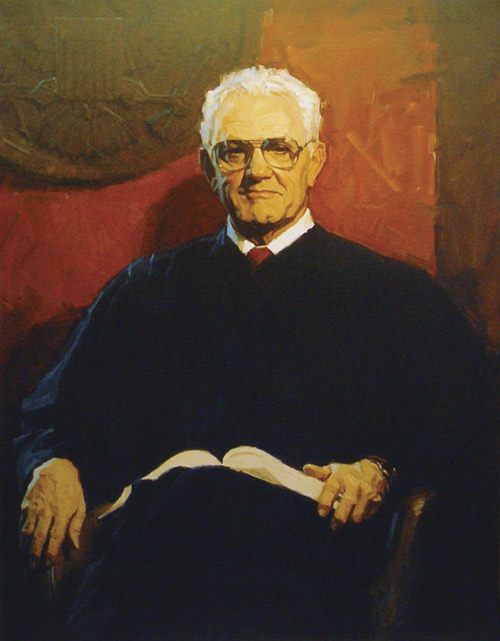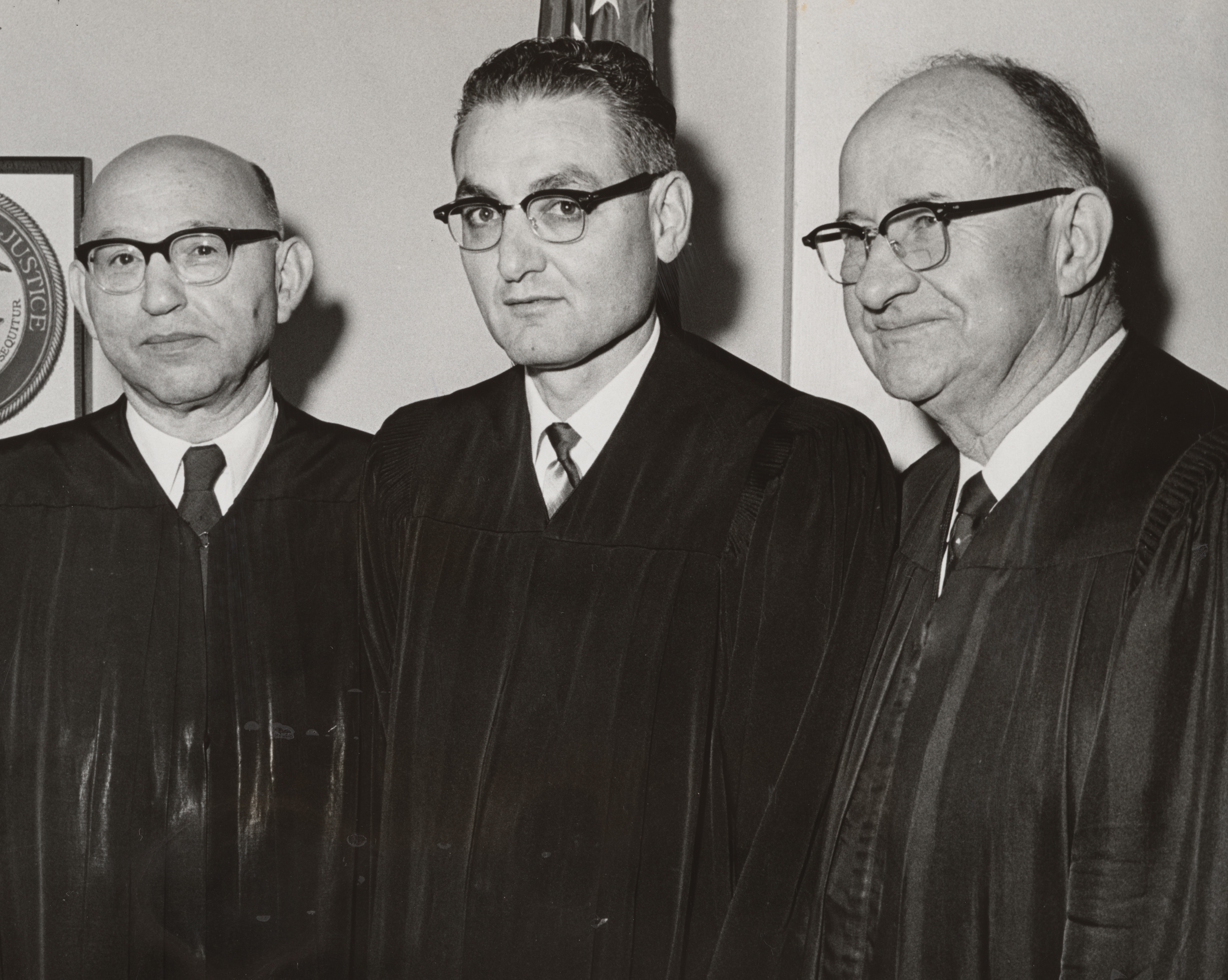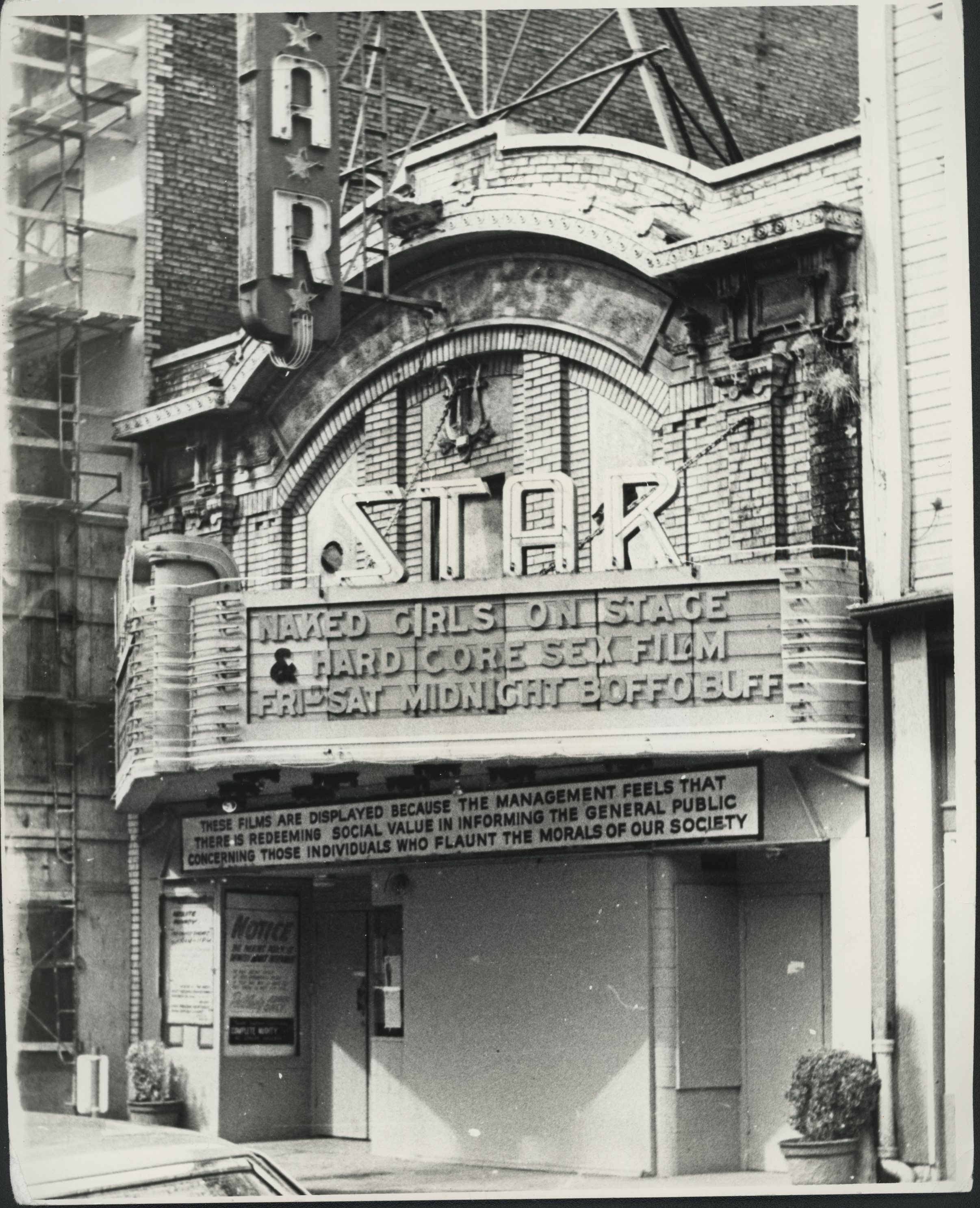Alfred Theodore “Ted” Goodwin served as a judge for over sixty years and is one of only two judges in the nation to have been a state and federal trial judge and a state and federal appellate judge.
Goodwin was born on June 29, 1923, in Bellingham, Washington, his mother’s hometown. He entered the University of Oregon as “Tex” Goodwin from Crook County High School in Prineville, where his itinerant Baptist preacher father had taken a church. Goodwin worked on ranches during the summer and became an avid rider of horses. A participant in ROTC, he was called up for military service after two years at the university. He served in Europe and the Far East from 1943 to 1946. His typing skills led to his becoming a company clerk, and he became an “education officer” when his unit spent several months in the Philippines.
He returned to UO, where he was editor of the Daily Emerald and earned a degree in journalism. He also worked at the Eugene Register-Guard, where he had general reporting assignments; he continued at the paper in the year after his graduation in 1947. He graduated from the University of Oregon Law School in 1951.
Goodwin joined Darling & Vonderheit, a Eugene law firm with a general practice. Four years later, Governor Paul Patterson appointed him a Lane County Circuit Court judge. Of note is his striking down Oregon’s obscenity law in a case that resulted from a district attorney’s campaign against smut, a ruling reversed 4-3 by the Oregon Supreme Court in State v. Jackson (1960).
When U.S. Senator Richard Neuberger died in 1960, Governor Mark Hatfield appointed Goodwin to the Oregon Supreme Court after naming Justice Hall Lusk to fill the Senate position. Goodwin served for almost ten years on the Court, which received all appeals from the lower courts. He handled cases on criminal and civil topics, including common law matters, and was known for his skill in writing opinions.
Two of Goodwin’s Oregon Supreme Court rulings stand out. Lowe v. City of Eugene (1969), known as the Eugene Cross Case, was a challenge to the presence of a large cross atop Skinner’s Butte in Eugene. Goodwin wrote that the cross should be removed. Of greater importance was State ex rel. Thornton v. Hay (1969), the Oregon Beaches Case, where a Cannon Beach motel owner claimed exclusive access to the beach outside the motel for his customers. Goodwin wrote for the court that the beach between mean high tide and the visible vegetation line belonged to the public, thus preserving the dry-sand area for the public.
When in 1969 U.S. Senator Mark O. Hatfield recommended U.S. District Judge John Kilkenny for nomination to the U.S. Court of Appeals for the Ninth Circuit to protect the “Oregon seat,” he nominated Goodwin to take Kilkenny’s position on the District Court. Goodwin served on the District Court with Chief Judge Gus Solomon and Judges Robert Belloni and Otto Skopil. One of Goodwin’s important rulings, in the area of securities law, stemmed from the “Dare to be Great” movement, in which fraudster Glenn Turner’s proposals were deemed to be securities and thus subject to regulation. Another important case was a rare rebuke in 1970 to police in a ruling in favor of a Black Panthers member whom the Portland Police had been physically rough with during an arrest.
Two years later, when Kilkenny became a senior court of appeals judge, Hatfield recommended that Goodwin be nominated to fill the Ninth Circuit seat. During his first ten years on the Court of Appeals for the Ninth Circuit, Goodwin remained in Portland, but in the early 1980s, at the request of Chief Judge Richard Chambers, he relocated to Pasadena, California. He served for twenty years as the Ninth Circuit’s en banc (full bench) coordinator and became the circuit’s chief judge in 1988. In 1991, he took senior status, continuing for many years to handle a full load of cases. Goodwin moved to Sisters, Oregon, where he rode horses and raised sheep in addition to his Ninth Circuit work. He also kept his hand in District Court matters, “going over the mountain” to Eugene to assist Chief District Judge Michael Hogan.
On the Ninth Circuit, Judge Goodwin sat on many cases from Oregon or cases that affected the state. He was a member of the “spotted owl panel,” whose rulings enforcing federal environmental statutes had substantial effects on the Pacific Northwest timber industry. His best-known ruling came in Newdow v. U.S. Congress (2002–2003), which held that forcing schoolchildren to recite the “one nation under God” language of the Pledge of Allegiance was a violation of separation of church and state. (The U.S. Supreme Court overturned the ruling in 2004 on the basis of a defect in the plaintiff’s standing to sue.)
Among his numerous extra-judicial activities, while on the Oregon Supreme Court, Goodwin was involved in a failed effort to revise Oregon’s constitution and was a participant on the Salem Human Relations Commission. As a proponent of better relations among bench, bar, and press, with particular concern about pretrial publicity in criminal cases, he chaired committees in Oregon and for the American Bar Association, and he was also chair of the ABA committee on law school accreditations. He was also a member of the “court” that considers clergy discipline for the Presbyterian Church (U.S.A.). Goodwin passed away on December 27, 2022. He was ninety-nine years old.
-
![]()
Alfred Goodwin, as U.S. Circuit Court judge.
Courtesy Oregon Hist. Soc. Research Lib., Wong Studio, 018282
-
![]()
Portrait of Judge Alfred Goodwin, hanging in Pioneer Courthouse, Portland.
Courtesy Pioneer Courthouse Galleries.
-
![]()
Judge Goodwin, after being sworn in as U.S. District Court judge, with Gus Solomon (left) and Robert Belloni.
Courtesy Oregon Hist. Soc. Research Lib., 022998
Related Entries
-
![Gus J. Solomon (1906–1987)]()
Gus J. Solomon (1906–1987)
Gus J. Solomon, the second-longest-serving federal judge in Oregon hist…
-
![Oregon Beach Bill]()
Oregon Beach Bill
Oregonians struggling to maintain public access to Pacific Ocean beache…
-
![Otto Richard Skopil Jr. (1919–2012)]()
Otto Richard Skopil Jr. (1919–2012)
In the annals of Oregon jurisprudence history, Otto Richard Skopil Jr. …
-
![Robert C. Belloni (1919–1999)]()
Robert C. Belloni (1919–1999)
Robert C. Belloni was a federal judge on the U.S. District Court for th…
-
![Stripping in Oregon]()
Stripping in Oregon
Portland has more strip clubs per capita than any other city in the Uni…
Related Historical Records
Map This on the Oregon History WayFinder
The Oregon History Wayfinder is an interactive map that identifies significant places, people, and events in Oregon history.
Further Reading
Wasby, Stephen L. “Alfred T. Goodwin: A Special Judicial Career,” Western Legal History 15.1 (Winter/Spring 2002): 9-43.
Wasby, Stephen L. A Life in Judging: Ted Goodwin of Oregon. EBM Print on demand: Stephen Wasby, 2014.
Cases:
Eugene Cross Case: Lowe v. City of Eugene, 451 P.2d 117 (Or. 1969), 459 P.2d 222 (Or. 1969), 463 P.2d 360 (Or.1969)
Jackson: State v. Jackson, #53835 (Lane Co. Cir. Ct), 356 P.2d 495 (Or. 1960)
Oregon Beaches Case: State ex rel. Thornton v. Hay, 461 P. 2d 671 (Or. 1969)
Pledge of Allegiance case: Newdow v. U.S. Congress, 292 F.3d 597 (9th Cir. 2002), 328 F.3d 469 (9th Cir. 2003), Elk Grove Unified School Dist. v. Newdow, 51 U.S. 1 (2004)

